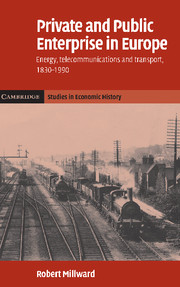Book contents
- Frontmatter
- Contents
- List of figures
- List of tables
- Preface
- Glossary and abbreviations
- Map: The European economy in 1914
- Part I Introduction
- Part II The Construction of the New European Infrastructure c. 1830–1914
- 2 Infrastructure development and rights of way in the early nineteenth century
- 3 Local supply networks, private concessions and municipalisation
- 4 Railways and telegraph: economic growth and national unification
- 5 Electricity supply, tramways and new regulatory regimes c. 1870–1914
- Part III Nations and Networks c. 1914–1945
- Part IV State Enterprise c. 1945–1990
- Part V Conclusions
- Appendix: Infrastructure service levels and public ownership c. 1910: a statistical analysis
- Bibliography
- Index
3 - Local supply networks, private concessions and municipalisation
Published online by Cambridge University Press: 14 July 2009
- Frontmatter
- Contents
- List of figures
- List of tables
- Preface
- Glossary and abbreviations
- Map: The European economy in 1914
- Part I Introduction
- Part II The Construction of the New European Infrastructure c. 1830–1914
- 2 Infrastructure development and rights of way in the early nineteenth century
- 3 Local supply networks, private concessions and municipalisation
- 4 Railways and telegraph: economic growth and national unification
- 5 Electricity supply, tramways and new regulatory regimes c. 1870–1914
- Part III Nations and Networks c. 1914–1945
- Part IV State Enterprise c. 1945–1990
- Part V Conclusions
- Appendix: Infrastructure service levels and public ownership c. 1910: a statistical analysis
- Bibliography
- Index
Summary
The technology of gas, electricity and trams in the nineteenth century allowed economies of scale in production and delivery over a spatially limited area. It is argued here that the initial developments were dominated by the private sector but that the pace of expansion thereafter was not affected decisively one way or the other by whether the utilities remained in private ownership or were taken over by municipalities. It is also argued that an ideological commitment to municipal socialism was not the prime determinant of the ownership pattern. Rather, it was the set of fiscal problems facing local authorities. These issues will be illustrated initially by the case of gas and water, which have a longer history than electricity and trams, which we will consider later.
Gas was produced from coking coal and was used initially for lighting, later for heat and power. It could be stored only for short periods and was expensive to transport. Here was a technology that yielded small local networks, most effective when each undertaking supplied one densely populated urban area. Not until the second half of the twentieth century, and especially with the discovery of deposits of natural gas, was there a real push for regional and national grids. This simple setting nonetheless demonstrates some of the central puzzles of public ownership at the local level in the nineteenth century.
- Type
- Chapter
- Information
- Private and Public Enterprise in EuropeEnergy, Telecommunications and Transport, 1830–1990, pp. 33 - 58Publisher: Cambridge University PressPrint publication year: 2005



